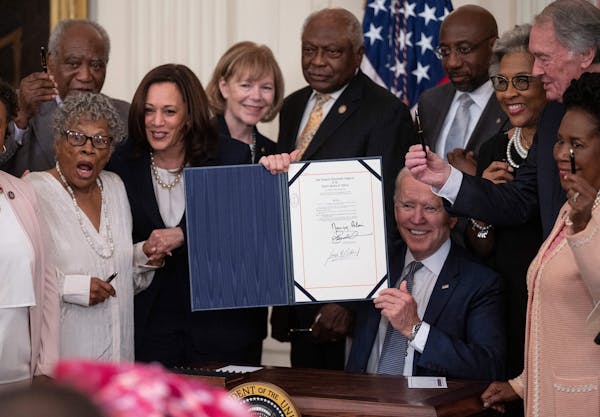While celebrating Juneteenth in north Minneapolis Saturday, Thomas Berry couldn't help but think about George Floyd, Philando Castile and other Black Minnesotans killed in encounters with police.
Their deaths, he said, are a stark reminder that Black Americans continue to be treated differently than white people more than 150 years after June 19 came to mark the end of slavery in the United States. Even though Juneteenth has now been recognized as a federal holiday, Berry said more change is needed for Black Americans to enjoy the same opportunities as their white neighbors.
"The same thing that was happening on the plantation is still happening today. … You literally have Black men or Black women being overly punished with no judicial system," said Berry, 44, program director of the Black Civic Network.
At Juneteenth gatherings across the Twin Cities on Saturday, feelings swung from a continuing skepticism that needed change is churning too slowly to a swelling hope that a summer of racial reckoning may finally be winning the allies needed to turn the tide against systemic racism. At the Rondo Commemorative Plaza in St. Paul, Mayor Melvin Carter shouted an upbeat "Good morning!" to the crowd, despite it being past 3 p.m., because "there's just something about right now that feels like a new day."
June 19, 1865, was when the last Black people in America learned of their freedom from slavery. The day is being more widely observed in the wake of the police killing of Floyd and subsequent Black Lives Matter protests. The U.S. Senate voted unanimously Tuesday to make Juneteenth a federal holiday, followed by the House on Wednesday. President Joe Biden signed it into law Thursday.
Members of the Minnesota United Black Legislative Caucus on Saturday said they plan to introduce a bill to make Juneteenth a state holiday.
At the Rondo gathering, Gov. Tim Walz looked out over what was once a thriving Black neighborhood before it was devastated by a freeway that tore through its center. He promised that times really are changing.
"That sense or urgency that you're feeling? It's real," he said, promising to not just acknowledge disparities in health care, housing, education and criminal justice — but to start doing something about them. "That potential that we want to see for your future is here."
Kashif Bangoura of St. Paul, 27, has been attending Juneteenth events since he was 6 years old. That it is now a federal holiday and employers have begun recognizing the day as a way to commemorate justice and equality "is exciting," he said.
Events of the past year haven't made a difference in the significance of the day — for him, Bangoura said. But perhaps it has for others. "Hopefully. Hopefully. I couldn't tell you."
Dominique Wells is a Minneapolis entrepreneur whose family has roots in Rondo.
"Juneteenth has always meant something special in the African American community. But to have other races and communities become involved in the way that they have is what's different now," she said. "And that is community right there, when you take different people from different parts and bring them together for one similar cause."
She added: "I do believe that more people are opening their eyes and starting to see that we have to come together as one."
At the North Side celebration outside Sanctuary Covenant Church, Shemeka Bogan, 31, beamed as she watched community members revel. Residents enjoyed free food, local vendors sold their goods and children gleefully played in a bounce house. After a difficult year filled with pandemic worries, a racial reckoning and surging gun violence, Bogan said this holiday felt "extra special."
Bogan, executive administrator of a local gun violence prevention initiative called "21 Days of Peace," was also relieved by the moment of community harmony. Earlier in the week, she said, an older woman working with the initiative was hit by a stray bullet at the same location.
"We have gone through years and years of trauma in so many different ways," Bogan said.
Berry spoke with community members about the idea of reparations for Black Minnesotans, handing out T-shirts and fliers promoting the concept. He said he is working with a Democratic state senator on a bill proposing reparations for Black Minnesotans who are descendants of slaves.
Such an effort could help close racial gaps in wealth and home and business ownership, Berry said.
"Minnesota still has the widest disparities in homeownership between African Americans and whites," he said.
Later in the afternoon, more than 100 people rallied at the State Capitol in St. Paul, also calling for reparations.
Camille Lewis, 60, of south Minneapolis, has celebrated Juneteenth for decades. While pressing issues such as gun violence and police reform were also on her mind Saturday, she stressed the importance of taking time to reflect on this important day's history.
"To me, Juneteenth should be about those in Galveston," Lewis said. "We need to know who they were."
Ryan Faircloth • 612-673-4234
James Walsh • 612-673-7428
Robbinsdale shelter-in-place alert accidentally sent countywide
Developer of St. Paul's Keg & Case food hall declares bankruptcy

Wildlife agency: Sturgeon won't go on endangered species list

Minnesotans interviewed to serve on Feeding Our Future trial

